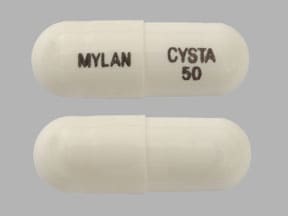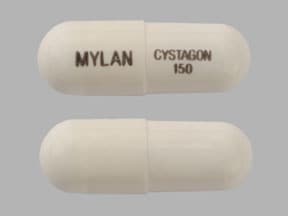What is Cystagon used for?
- Cystagon is used to treat nephropathic cystinosis.
Before taking Cystagon, tell your doctor:
- If you are allergic to Cystagon; any part of this medicine; or any other drugs, foods, or substances. Tell your doctor about the allergy and what signs you had.
- If you are breast-feeding or plan to breast-feed.
This medicine may interact with other drugs or health problems.
Tell your doctor and pharmacist about all of your drugs (prescription or OTC, natural products, vitamins) and health problems. You must check to make sure that it is safe for you to take Cystagon with all of your drugs and health problems. Do not start, stop, or change the dose of any drug without checking with your doctor.
What are some things I need to know or do while I take Cystagon?
For all patients taking Cystagon:
- Tell all of your health care providers that you take Cystagon. This includes your doctors, nurses, pharmacists, and dentists.
- Avoid driving and doing other tasks or actions that call for you to be alert until you see how Cystagon affects you.
- Have blood work checked as you have been told by the doctor. Talk with the doctor.
- Follow up with the doctor as you have been told.
- Avoid drinking alcohol while taking Cystagon.
- This medicine may raise the chance of ulcers or bleeding from the stomach or bowel. Talk with the doctor.
- Low white blood cell counts have happened with Cystagon. This may lead to a higher chance of getting an infection. Call your doctor right away if you have signs of infection like fever, chills, or sore throat.
- Tell your doctor if you are pregnant or plan on getting pregnant. You will need to talk about the benefits and risks of using Cystagon while you are pregnant.
Children:
- If your child's weight changes, talk with the doctor. The dose of Cystagon may need to be changed.
How is Cystagon best taken?
Use Cystagon as ordered by your doctor. Read all information given to you. Follow all instructions closely.
- Swallow whole. Do not chew or crush.
- Keep taking Cystagon as you have been told by your doctor or other health care provider, even if you feel well.
- You may sprinkle contents of capsule on food.
What do I do if I miss a dose?
- Take a missed dose as soon as you think about it.
- If it is less than 2 hours until your next dose, skip the missed dose and go back to your normal time.
- Do not take 2 doses at the same time or extra doses.
What are the side effects of Cystagon that I need to call my doctor about immediately?
WARNING/CAUTION: Even though it may be rare, some people may have very bad and sometimes deadly side effects when taking a drug. Tell your doctor or get medical help right away if you have any of the following signs or symptoms that may be related to a very bad side effect:
- Signs of an allergic reaction, like rash; hives; itching; red, swollen, blistered, or peeling skin with or without fever; wheezing; tightness in the chest or throat; trouble breathing, swallowing, or talking; unusual hoarseness; or swelling of the mouth, face, lips, tongue, or throat.
- Signs of fluid and electrolyte problems like mood changes, confusion, muscle pain or weakness, a heartbeat that does not feel normal, very bad dizziness or passing out, fast heartbeat, more thirst, seizures, feeling very tired or weak, not hungry, unable to pass urine or change in the amount of urine produced, dry mouth, dry eyes, or very bad upset stomach or throwing up.
- Ringing in ears.
- Dizziness or passing out.
- Feeling sleepy.
- Eye pain.
- Black, tarry, or bloody stools.
- Throwing up blood or throw up that looks like coffee grounds.
- Stomach pain.
- Upset stomach or throwing up.
- Not hungry.
- Low mood (depression).
- A very bad skin reaction (toxic epidermal necrolysis) may happen. It can cause very bad health problems that may not go away, and sometimes death. Get medical help right away if you have signs like red, swollen, blistered, or peeling skin (with or without fever); red or irritated eyes; or sores in your mouth, throat, nose, or eyes.
- Raised pressure in the brain has happened with Cystagon. Most of the time, this will go back to normal after Cystagon is stopped. Sometimes, loss of eyesight may happen and may not go away even after Cystagon is stopped. Call your doctor right away if you have a headache or eyesight problems like blurred eyesight, seeing double, or loss of eyesight.
- Very bad skin problems like stretch marks, joint problems, and bone problems like broken bones and deformed bones have happened with Cystagon. Call your doctor right away if you have any skin changes or bone or joint pain.
What are some other side effects of Cystagon?
All drugs may cause side effects. However, many people have no side effects or only have minor side effects. Call your doctor or get medical help if any of these side effects or any other side effects bother you or do not go away:
- Diarrhea.
- Feeling tired or weak.
- Change in body odor.
- Bad breath.
- Eye irritation.
- Flu-like signs.
- Nose or throat irritation.
- Ear pain.
These are not all of the side effects that may occur. If you have questions about side effects, call your doctor. Call your doctor for medical advice about side effects.
You may report side effects to the FDA at 1-800-332-1088. You may also report side effects at https://www.fda.gov/medwatch.
If overdose is suspected:
If you think there has been an overdose, call your poison control center or get medical care right away. Be ready to tell or show what was taken, how much, and when it happened.
Cystagon Images
How do I store and/or throw out Cystagon?
- Store at room temperature.
- Store in the original container. Do not take out the antimoisture cube or packet.
- Protect from light.
- Keep lid tightly closed.
- Store in a dry place. Do not store in a bathroom.
- Keep all drugs in a safe place. Keep all drugs out of the reach of children and pets.
- Throw away unused or expired drugs. Do not flush down a toilet or pour down a drain unless you are told to do so. Check with your pharmacist if you have questions about the best way to throw out drugs. There may be drug take-back programs in your area.
Consumer information use and disclaimer
- If your symptoms or health problems do not get better or if they become worse, call your doctor.
- Do not share your drugs with others and do not take anyone else's drugs.
- Some drugs may have another patient information leaflet. Check with your pharmacist. If you have any questions about Cystagon, please talk with your doctor, nurse, pharmacist, or other health care provider.
- If you think there has been an overdose, call your poison control center or get medical care right away. Be ready to tell or show what was taken, how much, and when it happened.
This information should not be used to decide whether or not to take Cystagon or any other medicine. Only the healthcare provider has the knowledge and training to decide which medicines are right for a specific patient. This information does not endorse any medicine as safe, effective, or approved for treating any patient or health condition. This is only a brief summary of general information about this medicine. It does NOT include all information about the possible uses, directions, warnings, precautions, interactions, adverse effects, or risks that may apply to Cystagon. This information is not specific medical advice and does not replace information you receive from the healthcare provider. You must talk with the healthcare provider for complete information about the risks and benefits of using this medicine.





